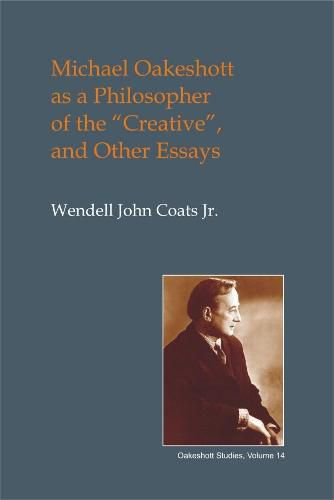Readings Newsletter
Become a Readings Member to make your shopping experience even easier.
Sign in or sign up for free!
You’re not far away from qualifying for FREE standard shipping within Australia
You’ve qualified for FREE standard shipping within Australia
The cart is loading…






This title is printed to order. This book may have been self-published. If so, we cannot guarantee the quality of the content. In the main most books will have gone through the editing process however some may not. We therefore suggest that you be aware of this before ordering this book. If in doubt check either the author or publisher’s details as we are unable to accept any returns unless they are faulty. Please contact us if you have any questions.
This book is a collection of eight (mostly) recent essays on the work of the 20th-century English philosophic essayist, Michael Oakeshott. Six of them advance the view in different ways that Oakeshott’s multifarious lifework may be understood as variations on a singular insight - that the structure of experiential reality is ‘creative’ or ‘poetic’, with the form and content (the how and what) of thought and activity occurring simultaneously and conditioning one another reciprocally; and that this experiential structure has specifiable cultural, political and legal ramifications. In advancing and illustrating this viewpoint, comparisons and contrasts are drawn with medieval nominalism, philosophic idealism, Cartesianism, modernity, post-modernism, Chinese Daoism and with the views of thinkers such as Sir Henry Maine, Charles McIlwain, M.B. Foster, Leo Strauss, A.C. Graham, Friedrich Hayek, Efraim Podoksik, John Liddington, and others. Included also is an essay on the educational views of Oakeshott and A.N. Whitehead, and another on Oakeshott, Max Weber and Carl Schmitt and the relationship between politics and armed force. A very brief concluding postscript asserts the continued relevance (as a corrective) of Oakeshott’s views on the creative structure of human experience in an age of ‘artificial intelligence’ (AI).
$9.00 standard shipping within Australia
FREE standard shipping within Australia for orders over $100.00
Express & International shipping calculated at checkout
This title is printed to order. This book may have been self-published. If so, we cannot guarantee the quality of the content. In the main most books will have gone through the editing process however some may not. We therefore suggest that you be aware of this before ordering this book. If in doubt check either the author or publisher’s details as we are unable to accept any returns unless they are faulty. Please contact us if you have any questions.
This book is a collection of eight (mostly) recent essays on the work of the 20th-century English philosophic essayist, Michael Oakeshott. Six of them advance the view in different ways that Oakeshott’s multifarious lifework may be understood as variations on a singular insight - that the structure of experiential reality is ‘creative’ or ‘poetic’, with the form and content (the how and what) of thought and activity occurring simultaneously and conditioning one another reciprocally; and that this experiential structure has specifiable cultural, political and legal ramifications. In advancing and illustrating this viewpoint, comparisons and contrasts are drawn with medieval nominalism, philosophic idealism, Cartesianism, modernity, post-modernism, Chinese Daoism and with the views of thinkers such as Sir Henry Maine, Charles McIlwain, M.B. Foster, Leo Strauss, A.C. Graham, Friedrich Hayek, Efraim Podoksik, John Liddington, and others. Included also is an essay on the educational views of Oakeshott and A.N. Whitehead, and another on Oakeshott, Max Weber and Carl Schmitt and the relationship between politics and armed force. A very brief concluding postscript asserts the continued relevance (as a corrective) of Oakeshott’s views on the creative structure of human experience in an age of ‘artificial intelligence’ (AI).